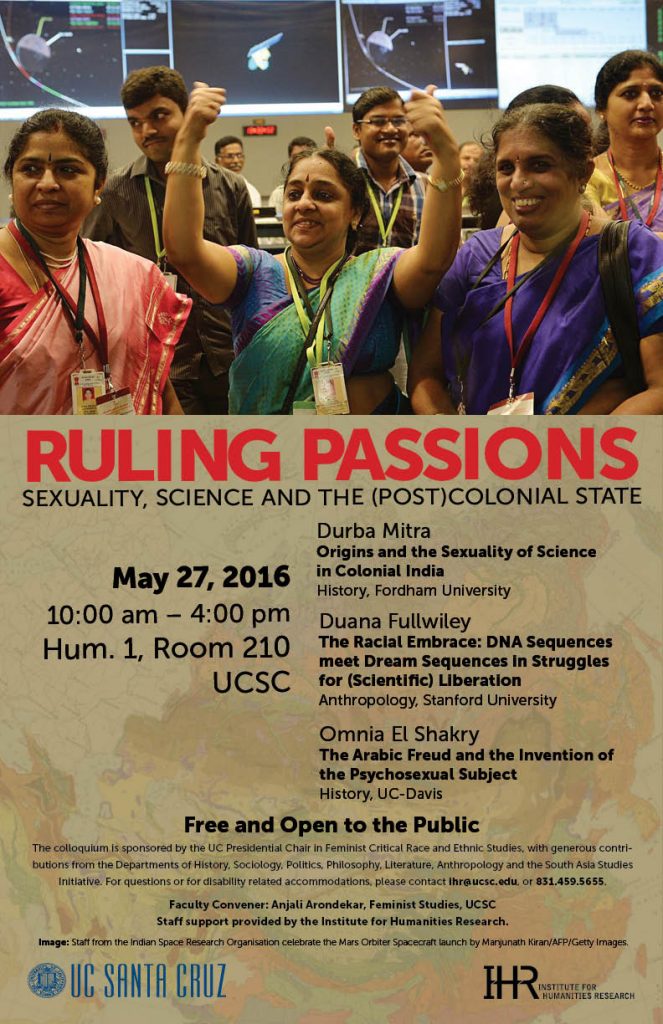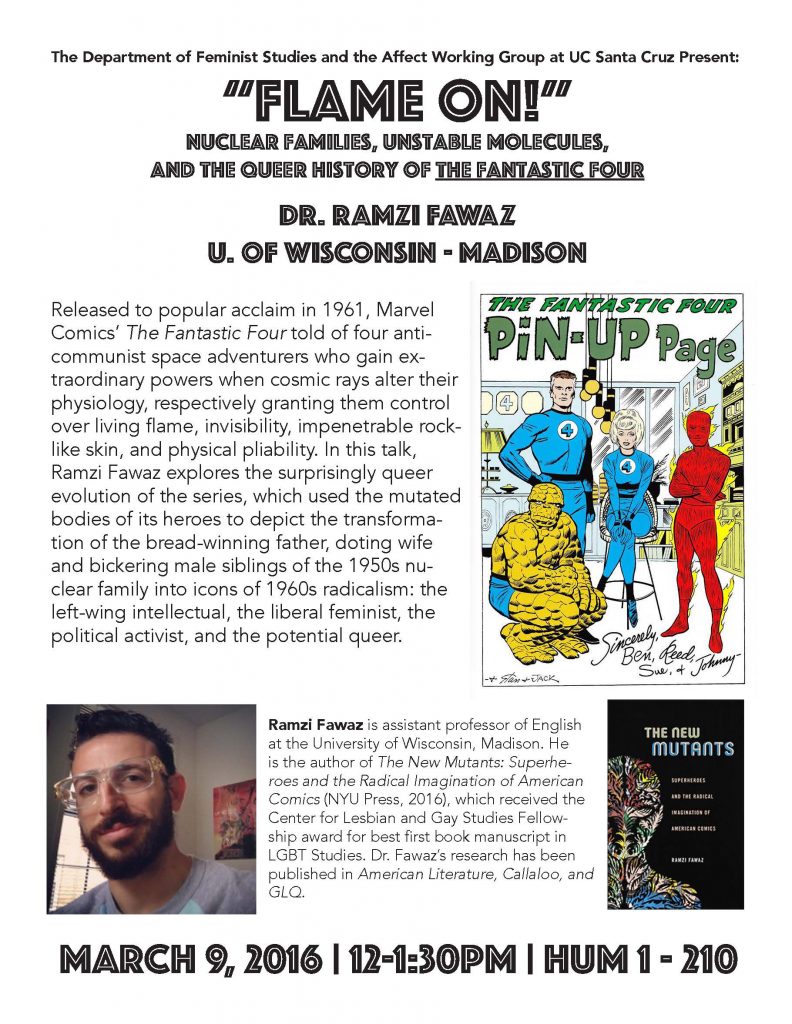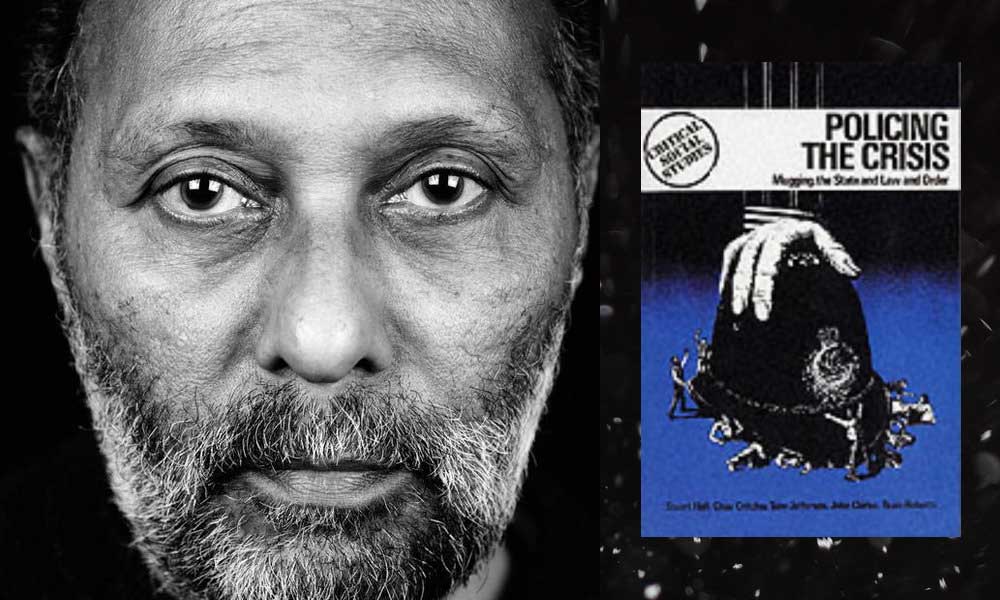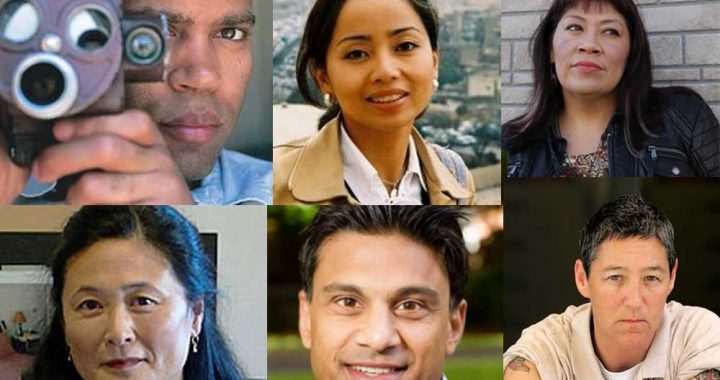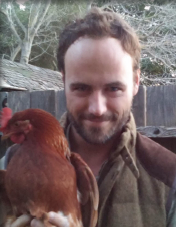Monday, May 18 / POLITICS SPEAKER SERIES / Andrew March / “The Problem of Sovereignty in Modern Islamic Political Thought” / 3:30 – 5:00 / Charles E. Merrill Lounge
Monday, May 18 / CENTER FOR JEWISH STUDIES / Maurice Samuels / “French Universalism and the Jews: Anti-Antisemitism and the Right to Difference” / 4:00-6:00pm / Humanities 1, Room 210
Monday, May 18 / FILM + DIGITAL MEDIA ARTIST SPEAKERS SERIES / Kevin Jerome Everson / Screening of “Erie” and Artist Q&A / 7:00pm / Communications 150 (Studio C)
Tuesday, May 19 / HISTORY DEPARTMENT / David Brundage / “Remembering 1916 in America: The Easter Rising’s Many Faces, 1919-1962″ / 2:00-3:00pm / Humanities 1, Room 520
Tuesday, May 19 / CRISIS IN THE CULTURES OF CAPITALISM RESEARCH CLUSTER / Neferti Tadiar / “Next to Nothing” / 4:00-6:00pm / Humanities 1, Room 210
Tuesday, May 19 / INSTITUTE FOR THE ARTS AND SCIENCES / Last LASER (Leonardo Art/Science Evening Rendezvous) of the Year / 6:30-8:00pm / Digital Arts Research Center (DARC) Dark Lab, Room 108
Wednesday, May 20 / SCIENCE & JUSTICE / Kim TallBear / “Crossing Cultures of Expertise and Tradition: Opportunities and Challenges in Cultivating Indigenous Scientists” / 4:00-6:00pm / Engineering 2, Room 599
Wednesday, May 20 / DEPARTMENT OF LANGUAGES AND APPLIED LINGUISTICS / Kimberly Adilia Helmer / “Learning Spanish is a Waste of Time: Understanding Heritage Learner Resistance in a Southwest Charter High School” / 5:00-7:00pm / Humanities 1, Room 210
Thursday, May 21 / CRITICAL RACE & ETHNIC STUDIES / Lisa Lowe, Jack Halberstam & Chandan Reddy / “Perverse Modernities: Conversations in Critical Race and Ethnic Studies” / 3:00-7:00pm / Humanities 2, Room 259
Thursday, May 21 / LIVING WRITER SERIES / Eleni Sikelianos & Josef Sikelianos / 6:00-7:45pm / Humanities Lecture Hall, Room 206
Friday, May 22 / CENTER FOR GAMES & PLAYABLE MEDIA / “Natives in Game Dev Gathering” / 10:00am-5:00pm / UCSC Extension Silicon Valley Building
Friday, May 22 / FRIDAY FORUM FOR GRADUATE RESEARCH / Muiris Macgiollabhui / “Carrying The Green Bough: An Atlantic History of the United Irishmen, 1791-1830″ / 12:00-1:30pm / Humanities 1, Room 202
Friday, May 22 / UCSC BIOS RESEARCH CLUSTER / Mark Andrejevic / “Drone Theory: Automated Data Collection and Processing and the Always-On War” / 12:00-1:30pm / Humanities 1, Room 210
* To advertise your unit or department’s event in the “Of Interest” section of this weekly bulletin, please e-mail complete event information in text format (no PDFs) to cult@ucsc.edu no later than noon on Friday of the prior week.
* Additional information and regular updates on “Of Interest” events can be found on the IHR website and on the Cultural Studies website.
OF-INTEREST EVENT DESCRIPTIONS:
Monday, May 18 / POLITICS SPEAKER SERIES / Andrew March / “The Problem of Sovereignty in Modern Islamic Political Thought” / 3:30 – 5:00 / Charles E. Merrill Lounge
Andrew March will be speaking about his on-going book project, which is an analytic history of modern Islamic thought on political sovereignty and the foundations of government. Its main focus is on a tradition of thinking on sovereignty that has developed since the late 19th and early 20th century, associated originally with Islamic Modernism and more recently with the thought of Tunisian Islamist Rashid al-Ghannushi and many other thinkers within the broad orbit of the Islamist movement. A central idea advanced in this discourse is that all mankind (following certain verses of the Qur’an) have inherited the vicegerency (caliphate) of God. This doctrine, along with very popular views on the meaning of God’s law which stress the centrality of public welfare and God’s purposes (maqasid) in creating the law, pave the way for a more popular, but still constrained, conception of sovereignty. God remains the ultimate legislator, and the author of man’s rights, but mankind at large (primarily, although not always exclusively, Muslims) is authorized collectively to establish government, constitute itself as a political entity and define in its broad and narrow particulars what it means to apply God’s law. His study is aimed at mapping out these various genealogies of sovereignty, exploring the various paradoxes and ambiguities in trying to reconcile ideals of divine and popular sovereignty in Islamic political theology, and elaborating their most recent doctrinal manifestations and developments since 2011.
Andrew F. March is Associate Professor of Political Science, Yale University. His research interests are in the areas of Islamic law and political thought, contemporary political theory, the history of political thought and religion and politics.
(top)
Monday, May 18 / CENTER FOR JEWISH STUDIES / Maurice Samuels / “French Universalism and the Jews: Anti-Antisemitism and the Right to Difference” / 4:00-6:00pm / Humanities 1, Room 210
In conflicts over the veil or the return of antisemitism in France today, minority difference is often seen as a threat not only to public order but to the Republic itself. Long on the defensive, universalism has now staged a comeback in current discourse that seeks to guard against excessive communitarianism or the fantasized demon of American-style multi-culturalism. However, the universal and the particular were not always as opposed as today seems to be the case. In this paper, I look back at the history of the way the universal was theorized in relation to France’s paradigmatic minority—the Jews—from the Revolution through the nineteenth century. My goal is to show that prior to the hardening of positions during the Dreyfus Affair, French universalism was far more welcoming to minority difference than is ordinarily assumed today. Recovering this history, I suggest, might offer ways around France’s current ethnic and religious dilemmas.
Maurice Samuels is Betty Jane Anlyan Professor of French at Yale, where he also directs the Yale Program for the Study of Antisemitism. He’s is the author of “The Spectacular Past: Popular History and the Novel in Nineteenth-Century France,” published by Cornell University Press in 2004, and of “Inventing the Israelite: Jewish Fiction in Nineteenth-Century France,” published by Stanford University Press in 2010, which won the Scaglione Prize given by the MLA for the best book in French Studies. He also co-edited “Nineteenth-Century Jewish Literature: A Reader,” published by Stanford in 2013.
(top)
Monday, May 18 / FILM + DIGITAL MEDIA ARTIST SPEAKERS SERIES / Kevin Jerome Everson / Screening of “Erie” and Artist Q&A / 7:00pm / Communications 150 (Studio C)
Erie consists of entrancing single-take, 16mm black-and-white sequences filmed in and around the communities surrounding Lake Erie. Scenes explore African American migration from the South to the North, contemporary conditions, everyday tasks and labors, theater, and famous art objects. Erie has been described as “a revelation… full of images of pure poetry” on Turner Classic Movies’ blog and has been seen and honored at film festival awards around the world.
Ohio native Kevin Jerome Everson, who has made six feature films and over ninety shorts, is one of the most prolific and remarkable independent filmmakers working today. His work has been exhibited internationally at festivals, museums, cinemas and galleries, including the 2008 and 2012 Whitney Biennials. A solo exhibition of his short films, More Than That: The films of Kevin Jerome Everson was held at the Whitney in 2011. He has been the subject of career retrospectives at the Centre Pompidou, Paris and Visions du Reel, Nyon. He is the recepient of the 2012 Alpert Award in the Arts for Film/Video.
With a sense of place and historical research, Kevin Jerome Everson’s films combine scripted and documentary moments with rich elements of formalism. The subject matter is the gestures or tasks caused by certain conditions in the lives of working class African Americans and other people of African descent. The conditions are usually physical, social-economic circumstances or weather. Instead of standard realism he favors a strategy that abstracts everyday actions and statements into theatrical gestures, in which archival footage is re-edited or re-staged, real people perform fictional scenarios based on their own lives and historical observations intermesh with contemporary narratives. The films suggest the relentlessness of everyday life—along with its beauty—but also present oblique metaphors for art-making.
(top)
Tuesday, May 19 / HISTORY DEPARTMENT / David Brundage / “Remembering 1916 in America: The Easter Rising’s Many Faces, 1919-1962″ / 2:00-3:00pm / Humanities 1, Room 520
David Brundage is Professor of history and the History Graduate Program Director.
The talk will draw on an essay-in-progress for a collection entitled Remembering 1916: The Easter Rising, the Somme and the Politics of Memory, ed. Richard S. Grayson and Fearghal McGarry. Brundage focuses his attention on a period that has been relatively neglected in the history of the Irish in America, the 1920s through the early 1960s. How (and by whom) was the 1916 Rising remembered in this period? Providing some answers to this question can tell us a great deal about the striking diversity of memory practices, while also shedding light on important aspects of Irish American (and American) life in these decades.
A once powerful Irish American nationalist movement shrank dramatically in this period. Nonetheless, the Rising continued to be remembered (differently) by Catholic churchmen, Irish American labor leaders, African American nationalists, and Hollywood. The telling of the Easter Rising story, Brundage argues, had a kind of modular character. That is, narratives of 1916, frequently marked by stirring examples of idealism, courage, and sacrifice, could be lifted out of their specifically Irish context and used to legitimize or inspire other sorts of movements and agendas—or simply to entertain. Remembering 1916 in America involved a diverse array of people, practices, and motives, and its analysis has the potential to shed light on important mid-twentieth century topics ranging from African American nationalism to representations of Ireland and the Irish in American popular culture.
(top)
Tuesday, May 19 / CRISIS IN THE CULTURES OF CAPITALISM RESEARCH CLUSTER / Neferti Tadiar / “Next to Nothing” / 4:00-6:00pm / Humanities 1, Room 210
This talk is a meditation on remaindered life, the unsubsumable, indivisible yet every-diminishing leftover of life-making practice for those who live in proximity to a social state of utter valuelessness. Drawing on diverse yet connected social contexts of redundant or superfluous populations, including undocumented immigrants, refugees, guest workers, and criminalized black and brown men and women, in a global, post-Fordist economy where all life bears the potential to serve as a direct means and source for the extraction of capitalist value, the talk explores the significance of lives lived on the perpetual verge of being nothing not only to offer an alternative account of the current globopolitical order. Tracing the constitutive elements of slavery and colonialism in this global present, the talk also reflects on the petty social currencies of small-time living as a speculative exercise on what is to be done next.
(top)
Tuesday, May 19 / INSTITUTE FOR THE ARTS AND SCIENCES / Last LASER (Leonardo Art/Science Evening Rendezvous) of the Year / 6:30-8:00pm / Digital Arts Research Center (DARC) Dark Lab, Room 108
Join us for refreshments at 6:30 p.m. followed at 7 p.m. with presentations by:
Daniel Press is the Olga T. Griswold Professor of Environmental Studies and Executive Director of the Center for Agroecology and Sustainable Food Systems at UC Santa Cruz. His research interests include environmental politics and policy, land preservation, water quality regulation and management, industrial ecology, and policy analysis. He is the author of Democratic Dilemmas in the Age of Ecology: Trees and Toxics in the American West (Duke University Press, 1994), Saving Open Space: The Politics of Local Preservation in California (UC Press, 2002), and American Environmental Policy: The Failures of Compliance, Abatement and Mitigation (Edward Elgar, 2015).
Roger Linington is Associate Professor of Biochemistry at UC Santa Cruz. His research centers on marine natural products used in biomedical science. Linington’s research has two major focuses: drug discovery for neglected infectious diseases including malaria, TB and dengue fever, and the use of natural products as probes for biological systems.
Anita Chang is an independent filmmaker, educator and writer. She is also currently a PhD Candidate in Film and Digital Media, UC Santa Cruz. Chang’s films are engaged in discourses on (post)colonialism, ethnography, diaspora and cross-cultural representation. Chang has taught film in numerous community and academic settings in San Francisco, Nepal and Taiwan. Honors include grant awards from Creative Capital, Fulbright Foundation, San Francisco Arts Commission, National Geographic and KQED Peter J. Owens Filmmaker program. Her essays have appeared in positions: asia critique, Concentric: Literary and Cultural Studies and Taiwan Journal of Indigenous Studies.
Kim Abeles is an activist and artist whose installations and community projects cross disciplines and media to explore biography, geography and environment. The work merges hand-crafted materials with digital representations. Abeles received the 2013 Guggenheim Memorial Fellowship, and is a recipient of fellowships from J. Paul Getty Trust Fund for the Visual Arts, California Community Foundation and Pollock-Krasner Foundation. She is a 2014/15 Lucas Visual Arts Fellow at the Montalvo Arts Center. She has exhibited in 22 countries, frequently creating artworks site specific to the location, including large-scale installations for exhibitions in Vietnam, Thailand, Czech Republic, England, China, and South Korea.
(top)
Wednesday, May 20 / SCIENCE & JUSTICE / Kim TallBear / “Crossing Cultures of Expertise and Tradition: Opportunities and Challenges in Cultivating Indigenous Scientists” / 4:00-6:00pm / Engineering 2, Room 599
Kim TallBear (University of Texas, Austin) will join us to discuss how genomics forms along with notions of race and indigeneity (the topic of her 2013 monograph, Native American DNA) and the novel roles that Native geneticists are playing in intervening in these processes to create a more just and democratic approach to genomics.
(top)
Wednesday, May 20 / DEPARTMENT OF LANGUAGES AND APPLIED LINGUISTICS / Kimberly Adilia Helmer / “Learning Spanish is a Waste of Time: Understanding Heritage Learner Resistance in a Southwest Charter High School” / 5:00-7:00pm / Humanities 1, Room 210
Through the lens of “resistance,” the current critical ethnography examines some causes of “strike-like” behavior observed in a Spanish heritage language class in a US southwest charter high school. Fundamental to student resistance was the lack of meaningful activity and authentic materials that connected curriculum to students’ linguistic strengths, target-culture knowledge, and the communities from which they came.
The native Spanish-speaking teacher taught the course as if the Mexican-origin students were foreign language learners without certain native-like language proficiencies and insider cultural knowledge gained from actual experience.
In turn, the instructor did not fully access his own linguistic and cultural repertoire, but instead relied on published foreign language materials that failed to engage students and constructed them as linguistic and cultural outsiders. A pueblo-based pedagogical framework is proposed to make curriculum more culturally relevant, authentic, and engaging.
(top)
Thursday, May 21 / CRITICAL RACE & ETHNIC STUDIES / Lisa Lowe, Jack Halberstam & Chandan Reddy / “Perverse Modernities: Conversations in Critical Race and Ethnic Studies” / 3:00-7:00pm / Humanities 2, Room 259
Perverse Modernities transgresses modern divisions of knowledge that have historically separated the consideration of sexuality, and its concern with desire, gender, bodies, and performance, on the one hand, from the consideration of race, colonialism, and political economy, on the other, in order to explore how the mutual implication of race, colonialism, and sexuality has been rendered perverse and unintelligible within the logics of modernity.
Books in the series have elaborated such perversities in the challenge to modern assumptions about historical narrative and the nation-state, the epistemology of the human sciences, the continuities of the citizen-subject and civil society, the distinction between health and morbidity, and the rational organization of that society into separate spheres. Perverse modernities, in this sense, have included queer of color and queer anticolonial subcultures, racialized sexualized laborers migrating from the global south to the metropolis, nonwestern desires and bodies and their incommensurability with the gendered, national or communal meanings attributed to them, and analyses of the refusals of normative domestic “healthy” life narratives by subjects who inhabit and perform sexual risk, different embodiments, and alternative conceptions of life and death. The project also highlights intellectual “perversities” from disciplinary infidelities and epistemological promiscuity, to theoretical irreverence and heterotopic imaginings.
(top)
Thursday, May 21 / LIVING WRITER SERIES / Eleni Sikelianos & Josef Sikelianos / 6:00-7:45pm / Humanities Lecture Hall, Room 206
Eleni Sikelianos believes in redistributing wealth (top to bottom) and in the overturning of Citizens United. She is the author of seven books of poetry, most recently The Loving Detail of the Living & the Dead (Coffee House, 2013), and two hybrid memoirs (The Book of Jon, City Lights, and You Animal Machine, Coffee House). Sikelianos has been the happy recipient of various awards for her poetry, nonfiction, and translations, including two National Endowment for the Arts Awards, a NYFA, NYSCA, and the National Poetry Series. Her work has been translated into over a dozen languages, and is widely anthologized. She has taught poetry in public schools, homeless shelters, and prisons, and collaborated with musicians, filmmakers, and visual artists. She is on guest faculty for the Naropa Summer Writing Program, and for L’Ecole de Littérature in France and Morocco; she teaches at the University of Denver, where she runs the Writers in the Schools program. She can be found online at: http://www.poets.org/poetsorg/poet/eleni-sik%C3%A9lian%C3%B2s
Josef Sikelianos is a songwriter and musician living in Berkeley CA. He heads the indie folk band Baby Teeth, who are releasing their first full length album this spring. After exploring many disciplines with some thoroughness, Sikelianos graduated cum laude from San Francisco State University with a degree in fine art. Sikelianos put himself through school doing tree work and is now also the owner of a professional tree service company, The Urban Arborist, working in the San Francisco Bay area. Sikelianos notes that “the greatest luxury is the exploration of aesthetics without premeditation or agenda, and the appreciation of beauty is in every endeavor I undertake.” In his spare time Sikelianos reads his sister’s books. He can be found online at: https://www.linkedin.com/pub/josef-sikelianos/2b/427/545
(top)
Friday, May 22 / CENTER FOR GAMES & PLAYABLE MEDIA / “Natives in Game Dev Gathering” / 10:00am-5:00pm / UCSC Extension Silicon Valley Building
Speakers:
Ishmael Angaluuk Hope (Never Alone)
Allen Turner (Stubbs the Zombie, Ehdrigohr: The Roleplaying Game, Hail to the Chimp, Disney Guilty Party, Marvel XP)
John Romero (Wolfenstein 3D, DOOM, Quake)
Jason Edward Lewis (Initiative for Indigenous Futures, Aboriginal Territories in Cyberspace, Skins Video Game Workshops)
Elizabeth LaPensée (Survivance, The Gift of Food, Animism, Singuistics: Anishinaabemowin)
Darrick Baxter (Rez Bomb, Ojibway)
Manuel Marcano (Max Payne 3, BioShock, The Darkness, Treachery in Beatdown City)
Renee Nejo (Ever, Jane, Gravity Ghost, Blood Quantum)
For more details, including the schedule, please see:
UC Santa Cruz to host Natives in Game Dev Gathering
(top)
Friday, May 22 / FRIDAY FORUM FOR GRADUATE RESEARCH / Muiris Macgiollabhui / “Carrying The Green Bough: An Atlantic History of the United Irishmen, 1791-1830″ / 12:00-1:30pm / Humanities 1, Room 202
The Friday Forum is a graduate-run colloquium dedicated to the presentation and discussion of graduate student research. The series will be held weekly from 12:00 to 1:30PM and will serve as a venue for graduate students in the Humanities, Social Sciences, and Arts divisions to share and develop their research. Light refreshments will be available.
For more info, or to inquire about joining the roster of presenters for the 2015-16 academic year, contact: fridayforum.ucsc@gmail.com
(top)
Friday, May 22 / UCSC BIOS RESEARCH CLUSTER / Mark Andrejevic / “Drone Theory: Automated Data Collection and Processing and the Always-On War” / 12:00-1:30pm / Humanities 1, Room 210
This presentation is not about drones per se – or even war per se; but rather about the deployment of ubiquitous, always-on, networked sensors for the purposes of automated data collection, processing, and response. It is also about the ways in which the logic of drone warfare: prediction and pre-emption, come to characterize a wide realm of social practices: marketing, job screening, health care, romance, and more. The presentation considers the ways in which some contemporary strands of critical theory replicate and rehearse the logics of data-driven droning: the advent of drone theory.
Mark Andrejevic is an Associate Professor of Media Studies at Pomona College. He researches the relationship between popular culture, interactive media, and surveillance. His books include, Reality TV: The Work of Being Watched (2004), iSpy: Surveillance and Power in the Interactive Era (2007), and Infoglut: How Too Much Information is Changing The Way We Think and Know (2013). He examines the social and cultural implications of data mining, predictive analytics, and other forms of surveillance that have become integral to how subjects interact with digital media and popular culture.
(top)
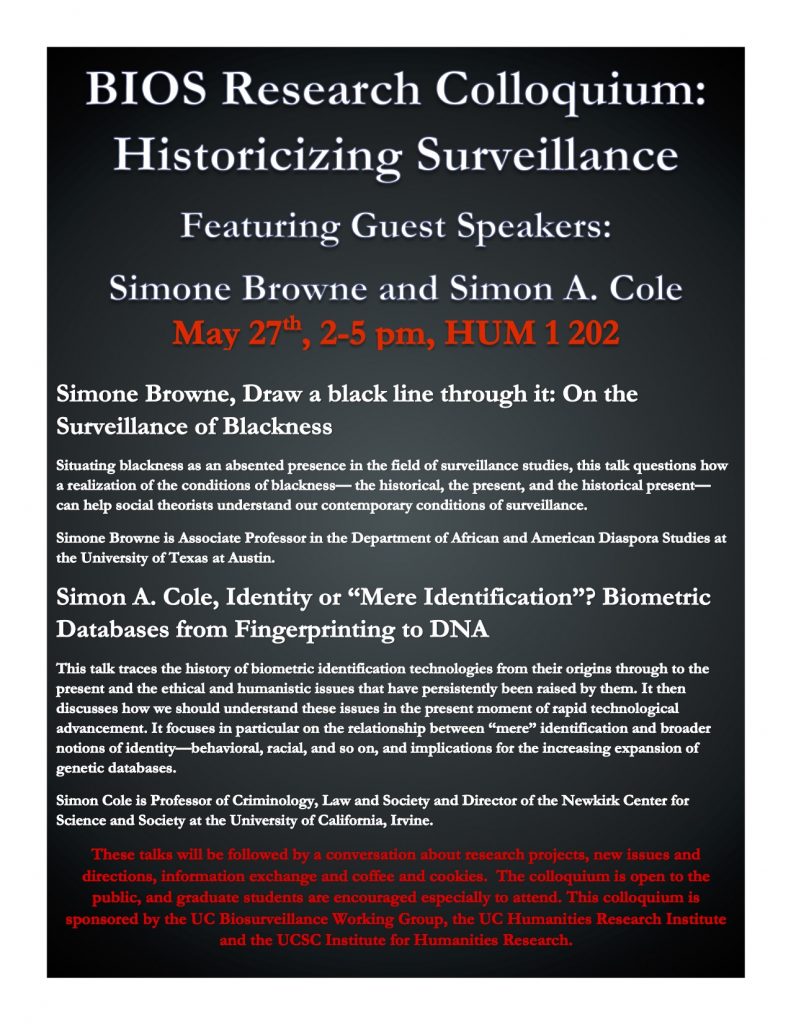
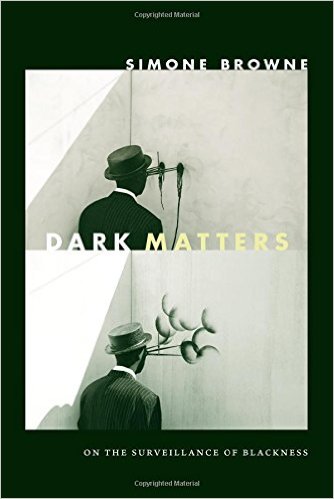 Simone Browne, Draw a black line through it: On the Surveillance of Blackness
Simone Browne, Draw a black line through it: On the Surveillance of Blackness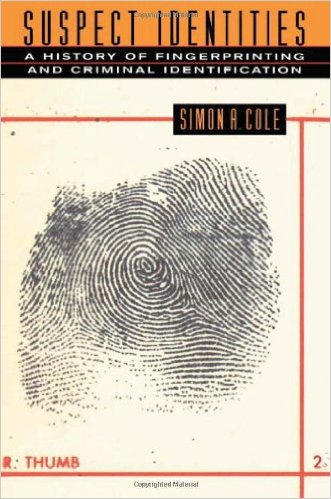 mon A. Cole, Identity or “Mere Identification”? Biometric Databases from Fingerprinting to DNA.
mon A. Cole, Identity or “Mere Identification”? Biometric Databases from Fingerprinting to DNA.
